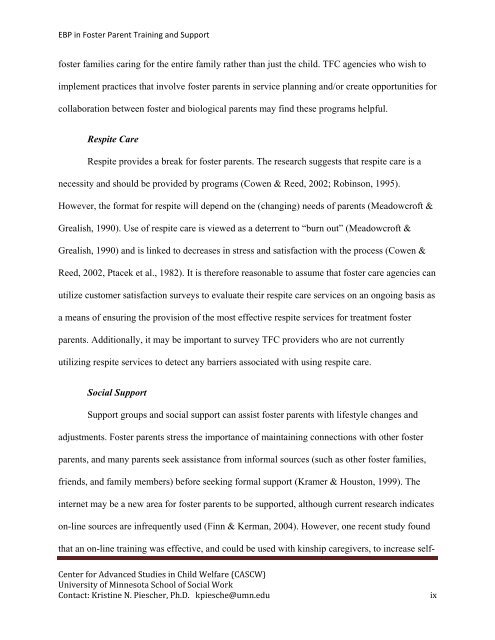Evidence-Based Practice in Foster Parent Training and Support ...
Evidence-Based Practice in Foster Parent Training and Support ...
Evidence-Based Practice in Foster Parent Training and Support ...
You also want an ePaper? Increase the reach of your titles
YUMPU automatically turns print PDFs into web optimized ePapers that Google loves.
EBP <strong>in</strong> <strong>Foster</strong> <strong>Parent</strong> Tra<strong>in</strong><strong>in</strong>g <strong>and</strong> <strong>Support</strong>foster families car<strong>in</strong>g for the entire family rather than just the child. TFC agencies who wish toimplement practices that <strong>in</strong>volve foster parents <strong>in</strong> service plann<strong>in</strong>g <strong>and</strong>/or create opportunities forcollaboration between foster <strong>and</strong> biological parents may f<strong>in</strong>d these programs helpful.Respite CareRespite provides a break for foster parents. The research suggests that respite care is anecessity <strong>and</strong> should be provided by programs (Cowen & Reed, 2002; Rob<strong>in</strong>son, 1995).However, the format for respite will depend on the (chang<strong>in</strong>g) needs of parents (Meadowcroft &Grealish, 1990). Use of respite care is viewed as a deterrent to “burn out” (Meadowcroft &Grealish, 1990) <strong>and</strong> is l<strong>in</strong>ked to decreases <strong>in</strong> stress <strong>and</strong> satisfaction with the process (Cowen &Reed, 2002, Ptacek et al., 1982). It is therefore reasonable to assume that foster care agencies canutilize customer satisfaction surveys to evaluate their respite care services on an ongo<strong>in</strong>g basis asa means of ensur<strong>in</strong>g the provision of the most effective respite services for treatment fosterparents. Additionally, it may be important to survey TFC providers who are not currentlyutiliz<strong>in</strong>g respite services to detect any barriers associated with us<strong>in</strong>g respite care.Social <strong>Support</strong><strong>Support</strong> groups <strong>and</strong> social support can assist foster parents with lifestyle changes <strong>and</strong>adjustments. <strong>Foster</strong> parents stress the importance of ma<strong>in</strong>ta<strong>in</strong><strong>in</strong>g connections with other fosterparents, <strong>and</strong> many parents seek assistance from <strong>in</strong>formal sources (such as other foster families,friends, <strong>and</strong> family members) before seek<strong>in</strong>g formal support (Kramer & Houston, 1999). The<strong>in</strong>ternet may be a new area for foster parents to be supported, although current research <strong>in</strong>dicateson-l<strong>in</strong>e sources are <strong>in</strong>frequently used (F<strong>in</strong>n & Kerman, 2004). However, one recent study foundthat an on-l<strong>in</strong>e tra<strong>in</strong><strong>in</strong>g was effective, <strong>and</strong> could be used with k<strong>in</strong>ship caregivers, to <strong>in</strong>crease self-Center for Advanced Studies <strong>in</strong> Child Welfare (CASCW)University of M<strong>in</strong>nesota School of Social WorkContact: Krist<strong>in</strong>e N. Piescher, Ph.D. kpiesche@umn.eduix
















